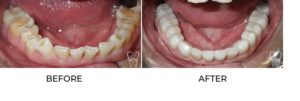 Research shows stress levels have been on the rise. According to a National Health Interview Survey, 75% of the population experiences at least some stress every 2 weeks while another 73% of people live with it weekly. Not only can stress compromise general wellness but also dental health. Stress is linked to a habitual habit of grinding and clenching the teeth, known as bruxism. Dr. Makadia understands time is of the essence to prevent additional damage. Dr. Makadia establishes treatment plans to meet each person’s specific needs. Here’s how Dr. Makadia helped one patient turn back the clock to repair the damage caused by years of grinding.
Research shows stress levels have been on the rise. According to a National Health Interview Survey, 75% of the population experiences at least some stress every 2 weeks while another 73% of people live with it weekly. Not only can stress compromise general wellness but also dental health. Stress is linked to a habitual habit of grinding and clenching the teeth, known as bruxism. Dr. Makadia understands time is of the essence to prevent additional damage. Dr. Makadia establishes treatment plans to meet each person’s specific needs. Here’s how Dr. Makadia helped one patient turn back the clock to repair the damage caused by years of grinding.
Understanding the Connection Between Bruxism and Stress
Bruxism is a condition that’s described as an unconscious habit of grinding and clenching teeth. Patients may not be aware of it because it often occurs while sleeping. The condition isn’t brought to their attention until after complications have developed, like jaw disorders, headaches, and other issues.
This was the case for one of our patients. Their teeth were severely worn, placing them at risk of serious dental issues, like decay, infection, and even tooth loss. Dr. Makadia examined their smile to establish a plan to restore their dental health while also preventing additional damage. Through dental restorations and a nightguard, Dr. Makadia was able to save the patient’s smile, restoring a quality of life they didn’t believe possible.
Treating Bruxism Requires a Strategic Approach
The pressure and friction of teeth grinding puts strain on the temporomandibular joint, which connects the jaw to the skull on either side of the face. The inflammation and tenderness can limit the mobility of the joint, leading to a TMJ disorder.
It’s not uncommon for the constant pressure to cause the gum tissue to separate from the teeth, exposing tooth roots. Gum recession increases the risk of tooth decay and gum disease. With the outer layer of the teeth weakened from friction, bruxism can cause tooth sensitivity, cavities, breaks, and fractures.
Reducing daily stressors through relaxation techniques can significantly decrease grinding and clenching, like meditation or yoga. Dr. Makadia may also recommend a nightguard, which is a custom-fit device that provides a layer of protection between the upper and lower teeth to absorb the pressure. A nightguard is an effective solution to preserve dental health and prevent jaw pain.
If you can’t reverse bruxism through relaxation alone, don’t wait to get the intervention you need. Dr. Makadia will provide the solutions you need to preserve your smile.
About Dr. Makadia
Dr. Makadia earned his dental degree from the New York University College of Dentistry. He has completed additional training in cosmetic and reconstructive periodontal surgery. Through his continuing education, he can treat a variety of oral health issues, like bruxism. If you’re ready to stop the grinding and clenching, contact our office today to schedule an appointment.
